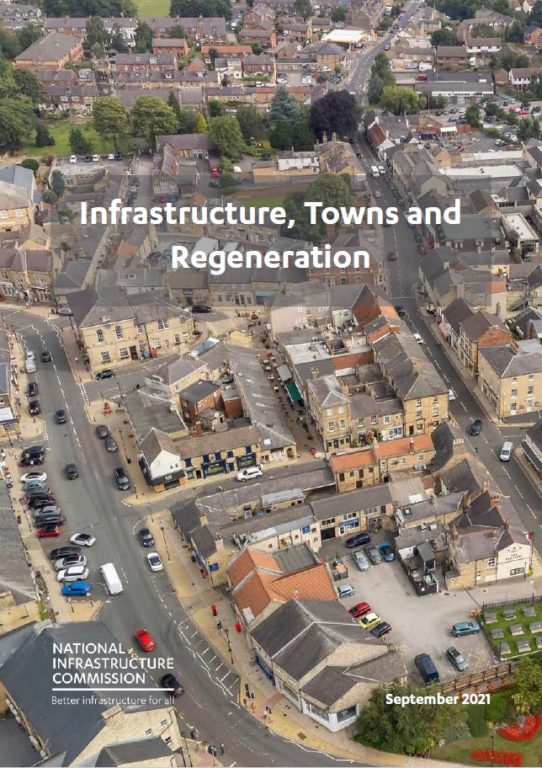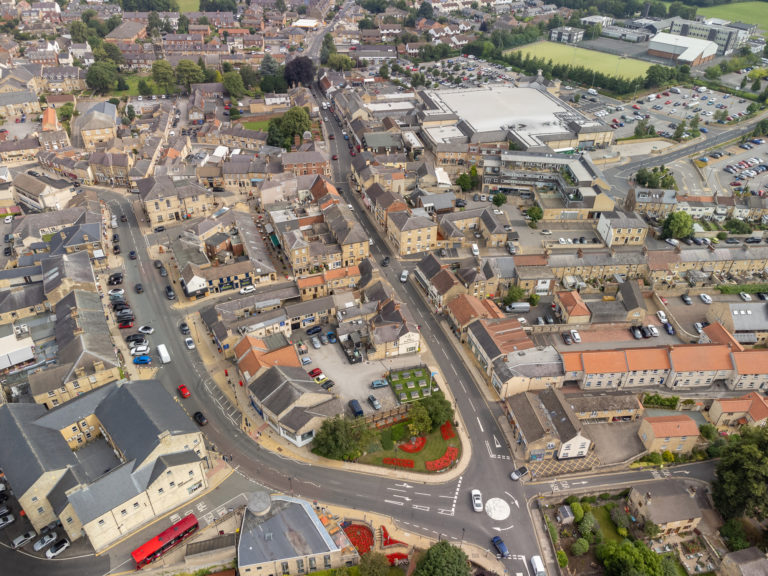Infrastructure, Towns and Regeneration
Status:Final report complete.
A study exploring how to maximise the benefits of infrastructure policy and investment for towns in England.
Towns across the country depend on infrastructure to support economic prosperity and good quality of life. Many towns offer the opportunity for growth and regeneration but may require infrastructure improvement to maximise their potential, while people living in towns everywhere need to have access to a decent level of infrastructure provision for social, leisure and work activities. Delivering the right infrastructure for towns can potentially help address economic and social imbalance between regions.
The government asked the Commission to make recommendations on how to maximise the benefits of infrastructure policy and investment for towns in England. The final report of the study was published on 23 September 2021.
The study focused on transport and digital infrastructure in particular, with the Commission ensuring that any recommendations in reserved areas are applicable across the UK. Terms of reference for the study (see tab on left hand side) were published by the government on 3 March 2021.
This study focused its attention on places outside city centres, specifically towns and suburban centres, considering the potential for both economic and quality of life benefits from infrastructure intervention in towns with different characteristics. The study also considered the potential implications of Covid-19 on infrastructure for towns, and will explore local governance and capability for delivering infrastructure.
Our approach
Throughout the study the Commission engaged with local leaders and other key stakeholders associated with towns across England to understand local priorities for the potential benefits of infrastructure. The Commission also engaged with relevant experts to ensure recommendations took account of the best available evidence.
The report launch event in Grimsby featured contributors from the Commission, NE Lincolnshire Council, Stevenage Borough Council and the Cabinet Office, and a range of invited online stakeholders. Watch the recording below:
Next Section:
Terms of reference for the study were published by the government on 3 March 2021.
Terms of reference for the study were published by the government on 3 March 2021.
In the National Infrastructure Strategy the government set out a high level of ambition in using infrastructure to support levelling up and regeneration.
To support the government’s work in this area, the National Infrastructure Commission will conduct a study on how to maximise the benefits of infrastructure policy and investment for towns.
This study will focus attention on places outside city centres, specifically towns and suburban centres. It will:
- Undertake analysis to provide an evidence base on the potential economic and quality of life benefits of infrastructure interventions in towns with different characteristics. Relevant characteristics would include not just those of a town itself (e.g. skills and industrial mix) but also its wider context (e.g. strength of links to surrounding towns and cities). It will also test whether there is a category of places that might benefit from more intensive improvements (e.g. because infrastructure is more obviously the key constraint), or an even spread approach getting the basics right everywhere that gives better results.
- Explore the impact of COVID-19 on towns, testing where and how local infrastructure policy needs to be shifted to deal with identifiable post-pandemic changes in behaviour; where uncertainty on behaviour persists, it will assess the most sensible approach to local infrastructure policy under uncertainty.
- Explore local delivery and capability, including how to ensure that regionally-significant but locally-owned projects can be co-ordinated across a wider area, and that local infrastructure strategies are joined up with planning, housing, skills and industrial strategy. This will include looking at what role the new infrastructure bank for the UK could play. Changes to local government structure and authority boundaries are out of the scope of this study.
The study should focus on transport and digital infrastructure in particular.
The study should focus on towns in England. However, the Commission should ensure that any recommendations in reserved areas (digital and the National Infrastructure Bank) are applicable across the whole of the UK.
The NIC should deliver a final report to government by the end of September 2021, setting out recommendations to government.
All recommendations should be consistent with the Commission’s fiscal and economic remits.
Next Section: Recommendations
The final report of this study makes nine recommendations to government on how infrastructure can better support economic prosperity and quality of life in towns.
Recommendations
The final report of this study makes nine recommendations to government on how infrastructure can better support economic prosperity and quality of life in towns.
Every local transport authority should have a long term infrastructure strategy
Every local transport authority should have a long term infrastructure strategy for the towns in its area, supported by a pipeline of projects. These strategies should be developed locally and collaboratively as part of, or complementary to, distinctive 15 year place based plans for the economic development of towns. Infrastructure strategies and wider plans should draw on local strengths, presenting a distinctive vision for towns. To ensure accountability, infrastructure strategies and wider plans should set out clear, transparent outcomes and, at the end of each five year funding period (see recommendation 2), local authorities will need to carry out assessments of whether those outcomes have been achieved.
Give local areas greater control over funding and decision making
The government should give local areas greater control over funding and decision making on local infrastructure investment. It should provide all county and unitary authorities, or combined authorities where they are in place, with devolved five year budgets for infrastructure, to match the arrangements in place for mayoral combined authorities. Funding should be allocated on a simple basis that reflects population and the size of the transport network being managed.
Provide targeted funding for key strategic priorities
In addition to devolved budgets for infrastructure, the government should provide targeted funding for key strategic priorities: where infrastructure outcomes are particularly poor, or where infrastructure could help towns seize economic opportunities. To access this targeted funding, places will have to demonstrate that they have a credible infrastructure strategy and wider placed based plan in place.
Make available expert strategic advice and support for towns
The government should make available expert strategic advice and support for places that lack the capability and capacity to develop their own infrastructure strategies and wider place based plans. The government should determine which national organisation or body is best placed to provide that support and ensure it is adequately funded.
Set out a clear plan for delivery of gigabit broadband to hardest to reach premises
The government should set out a clear plan, with milestones and funding, for delivery of gigabit broadband to the hardest to reach premises that will require public subsidy. In those towns where there are likely to be gaps in commercial rollout, and the government’s regional procurement programme is scheduled to start later, the government should work with local authorities and operators to identify opportunities for local solutions and facilitate voucher funded projects to accelerate coverage wherever possible.
Encourage take up of new communications networks by businesses
The government should develop a strategy by 2022 for encouraging the take up of new communications networks and services by small and medium enterprises.
Improve users’ experiences of local mobile connectivity
Ofcom and the government should consider real world user experience data, alongside prediction models, to improve the understanding of how people experience mobile connectivity in different places and identify any significant patterns that need to be addressed. As part of this, consideration should be given to whether Ofcom’s existing reporting on user experience can be extended to provide a more granular view of localised mobile user experience.
A roadmap for EVs charging infrastructure in towns
The government should publish the electric vehicle charging infrastructure strategy, without further delay, followed by a roadmap for the rollout of electric vehicle charging infrastructure in towns. Local infrastructure strategies should also include an active role for the local authority in planning and managing the rollout of on street electric vehicle charging.
Support innovation in towns where this can accelerate progress substantially
The government should support innovation in towns where trials would be too costly and risky for local authorities to run on their own, and where government involvement can accelerate progress substantially. This should be delivered via a local innovation fund and should include:
- partnering with towns to run innovation pilots for new communication technologies, including 5G use cases
- supporting experimentation and early rollout for innovations in on demand bus services.
Government should ensure that lessons from trials are transparently and proactively shared.

Latest Updates

Coming up in 2024
This page shows a calendar reflecting the latest expected dates for Commission reports, publications and events. You can also sign up to receive our quarterly newsletter by entering your email address in the box at the foot of each website page.

Commission repeats call for “urgent and fundamental reform” of local transport funding
The government has today published a formal response to the National Infrastructure Commission’s September 2021 report on how infrastructure can support economic growth and quality of life in English towns. The Commission’s central recommendation was a shift towards handing power to local areas to deliver their own infrastructure strategies with five-year devolved budgets, and a...

PWC Towns social research study
Social research looking at what residents of towns across England think about the quality of their local infrastructure.

The long term role of cars in towns
An opinion piece by Mike Davis, Consultant Engineer at E4Tech, and Jo Garvey-Rae, Senior Cost Manager at Turner & Townsend, both members of the Commission’s Young Professionals Panel. The last 12 months has seen a renewed recognition that some towns and places are being left behind, both in terms of productivity and wider quality of...

New study on infrastructure in towns
In its 2021 Budget, the government asked the Commission to undertake a new study looking specifically at the role of infrastructure in helping towns and urban areas outside major cities. The new study will have a particular focus on the role of transport and digital infrastructure in boosting economic regeneration and levelling up. More details...
